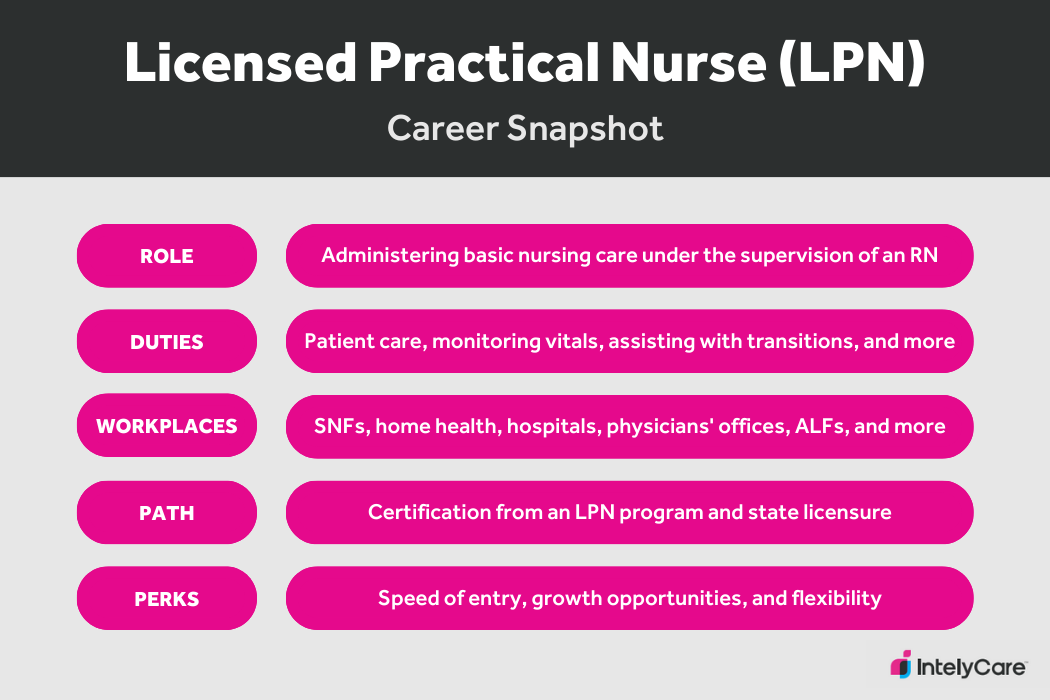What Does an LPN Do?

What does LPN stand for? An LPN — which means licensed practical nurse — is a healthcare professional who has completed a practical nursing program and passed a licensing examination. LPNs work under the supervision of registered nurses (RNs) or physicians, providing nursing care to patients.
But what does an LPN do, exactly? What role does this profession play in the healthcare arena? This article will answer all your LPN-related questions.

What Is an LPN?
So, what is LPN in nursing? LPN stands for licensed practical nurse. You’ll be part of a bigger healthcare team that assists patients daily as an LPN — meaning, you’ll administer nursing care in various settings under a registered nurse’s (RN’s) supervision. Note that in Texas and California, these professionals are called licensed vocational nurses (LVNs), while most states use the term LPN.
Some people wonder, Is an LPN a nurse? Yes — it’s right there in the name. LPNs are trained professionals who have had to undergo rigorous training and licensing to practice nursing.
What Does an LPN Do?
LPN responsibilities center around providing patients with primary and essential care, including monitoring vital signs, bathing, dressing, and other needs. Typical LPN duties include:
- Measuring a patient’s vitals, such as blood pressure and temperature.
- Assisting patients with activities of daily living, such as bathing, dressing, and toileting.
- Administering medications, including oral, injectable, and topical medications, as prescribed by a physician, under the RN’s supervision.
- Monitoring patients’ condition and reporting any changes to the RN or physician.
- Arranging for tests when there is a need for one.
- Assisting with medical procedures, such as catheter insertion, IV therapy, and respiratory treatments.
- Collaborating with other members of the healthcare team to ensure comprehensive patient care.
Still wondering, What can LPNs do? Look at this sample LPN job description and sample LPN resume.
What Is an LPN vs. RN?
One main difference between LPN and RN certifications is the length and scope of required education. RNs must complete an associate degree in nursing (ADN) or a bachelor’s of science in nursing (BSN), which typically take between two to four years, though some accelerated programs may be shorter. Additionally, RNs must pass the NCLEX-RN exam.
An LPN’s scope of practice is less than that of an RN. To be an LPN, you can complete a board-approved program in about 12 months. You must also receive a passing score on the NCLEX-PN exam.
What Do RNs Do That LPNs Don’t?
So, what does an LPN do that’s different from an RN? Although the exact differences vary depending on the state, here are several tasks commonly performed by RNs but often not by LPNs:
- Administering blood products and intravenous (IV) medications
- Supervising and delegating tasks
- Performing complex nursing procedures
- Developing and modifying care plans
- Evaluating and assessing patients
- Monitoring unstable patients
Where Do LPNs Work?
Nurses play a vital role in every healthcare system, but hospitals tend to employ a greater number of RNs than LPNs. As an LPN, you’ll typically find a greater demand in post-acute care settings. LPNs can apply their skills in:
- Assisted living facilities (ALFs)
- Skilled nursing facilities (SNFs)
- Home health care
- Hospitals
- Outpatient surgery centers
- Physicians’ practices
- Other clinical facilities
LPN Education Requirements
1. Earn a Certification From an Accredited LPN Program
Enroll and complete an LPN program. You’ll need a high school diploma or GED to be eligible, as it’s typically the minimum educational requirement for admission to LPN programs. These programs usually take one year to complete.
2. Obtain Licensure
To become an LPN, you need to pass the NCLEX-PN (National Council Licensure Examination for Practical Nurses) and submit all required documentation to your state’s board of nursing.
3. Gain Experience
Gain nursing experience in relevant specialties, such as long-term care, skilled nursing, or assisted living facilities. This background forms a solid base for entering other nursing specialties.
What Does an LPN Make?
The average LPN salary is $60,790 per year, or around $29.23 per hour. When comparing LPN vs. RN salary, an RN earns an average of $94,480 per year, around $45.42 per hour. Pay and benefits vary according to your certifications, years of service, and where you’re practicing. For example, with IntelyCare, LPNs are hired as W-2 employees who earn weekly pay and benefits. The states with the highest annual LPN pay are:
What Does an LPN Do? FAQs
What are the benefits of working as an LPN?
The rewards of the job are plentiful. Some of the benefits include speed of entry into the field, career growth opportunities, and flexibility to choose work shifts and schedules that meet your needs.
What are the best cities for LPNs?
According to the Bureau of Labor Statistics, these are some of the metropolitan areas with the highest level of employment for LPNs:
Check out all the LPN jobs on IntelyCare now to get more insight into where you could work.
LPN vs. CNA — what’s the difference?
The primary difference between a CNA and an LPN lies in their scope of practice and level of responsibility. LPNs undergo more extensive training and have a broader range of duties. On the other hand, CNAs complete a shorter training program, usually lasting a few months, and focus on basic patient care tasks such as bathing, dressing, and feeding.
How long does it take to become an LPN?
You can become a practicing LPN in as little as 12 months. This involves completing an LPN program, passing the NCLEX-PN exam, and applying for licensure in your state.
Where Will Your Career Take You?
So, what does an LPN do? You asked, and we answered. Curious about other opportunities? The IntelyCare nursing newsletter can hook you up with practical career advice that fit your needs.

